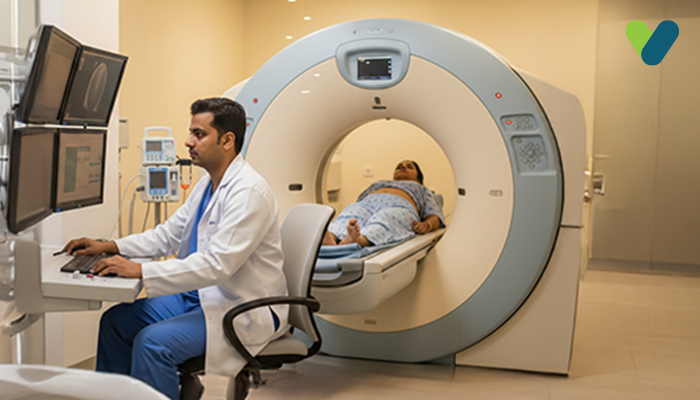Welcoming a baby into this world is an occasion of momentous joy and celebration. To ensure that your baby is born healthy, it is important to undergo the required tests, screenings, and doctors’ appointments. Prenatal screenings, especially, can be of immense help in ensuring that your foetus is growing as should be and is healthy. One such prenatal scan is the NT scan. The NT scan, also known as the nuchal translucency scan, helps screen your baby for any abnormalities. If you want to learn more about the NT scan, its procedure and how it can help, continue reading.
What is an NT Scan?
As mentioned, an NT scan is a routine prenatal screening examination that helps detect any abnormalities within foetuses. Normally, prenatal screenings are useful in detecting issues such as anaemia and gestational diabetes within babies. Such screenings are prescribed during different stages of pregnancy. An NT scan is usually scheduled between the 11th and 13th weeks of pregnancy.
The NT scan is a sonographic process to measure the size of clear tissue, known as the nuchal translucency, present at the back of a foetus’ neck. Presence of fluid or a clear space behind a baby’s neck is not unusual. However, if there is excessive clear space at the back of a baby’s neck, it could be an indicator of Down syndrome. It could also serve as an indicator of any other chromosomal abnormality like Edwards syndrome or Patau syndrome.
Essentially, our body consists of various kinds of cells, all of which have a nucleus. Nuclei hold our genetic information, including 23 pairs of chromosomes from each parent. Chromosomal abnormalities result when chromosomal matter materialises in a way that is not as it should be. For instance, in individuals who have Down syndrome, an additional copy of chromosome 21 is found. Similarly, Edwards syndrome and Patau syndrome are also chromosomal defects that occur rarely and can also prove to be fatal.
An NT scan can help you detect such abnormalities. It is scheduled during the first trimester of pregnancy as the tell-tale clear space behind a baby’s neck disappears by the 15th week.
How Does An NT Scan Function?
If you are planning on going for a nuchal translucency ultrasound, knowing how the procedure is conducted may help alleviate any apprehensions you might have. The screening begins when a doctor or technician executes and abdominal ultrasound. On the other hand, you could also require a transvaginal test, wherein an ultrasound probe is placed into your vagina.
Ultrasounds usually function by using high frequency sound waves to generate images from within your body. This image is used by a medical specialist or technician to measure the clear space, also known as translucency, behind a foetus’ neck. Once they have this data, they will plug in your age, or your date of birth, into a computer-run program to determine the risk your baby faces of developing an abnormality.
Do note that an NT scan cannot confirm and diagnose a baby with Down syndrome of other chromosomal abnormalities. All it can do is predict the chances of your baby developing such conditions. To confirm whether your baby will be born with any chromosomal abnormality or an unspecified health condition, you should consult a doctor. A doctor will recommend certain blood tests you should undertake to assess a foetus’ risk.
Also, the accuracy of such tests varies. Even if you follow up an NT scan with prescribed blood testing, the screening will be around 85% accurate for estimating the risk of developing Down syndrome. If you forego the blood testing, then the accuracy rate falls by a good ten percent.
How Should You Prepare For An NT Scan?
It is best to go for an NT scan procedure with a full bladder as that will generate ultrasound images that are easy to decipher. Thus, your doctor might ask that you drink plenty of water at least one hour prior to your appointment. Also, wear comfortable clothing since the ultrasound technician requires access to the area around your lower abdomen.
Usually, the entire testing process is complete within a span of 30 minutes. While the scan is going on, you will be asked to lie on a flat surface like an examination table. The technician will wave an ultrasound wand above your abdomen.
You might receive the results of the scan on the day of testing. The doctor in-charge may also want to discuss the finding from the screening with you prior to you leaving.
How To Interpret The Results Of An NT Scan?
Lastly, remember that NT scan reports are not absolute, but an indicator of possible conditions. Like many tests, an NT scan is not a perfect test and can throw up false positives. A normal NT scan does not rule out a foetus being born with a condition. Similarly, if the result is irregular, it doesn’t signify that your baby has chromosomal abnormalities, just that additional tests or investigations may be required.
To help you reach a more concrete diagnosis, your doctor might recommend a cell-free DNA test. This test looks at the foetal DNA present in your blood to assess your baby’s risk of developing Down syndrome or other abnormalities.
You can schedule an NT scan in the first trimester of your pregnancy for a prognosis of your baby’s health and to better plan for eventualities. While the test is optional, the NT scan can be of immense help to expectant parents to better understand the overall health of your foetus. If the possibility of an irregular result is causing anxiety, consult your doctor and make an informed decision.

